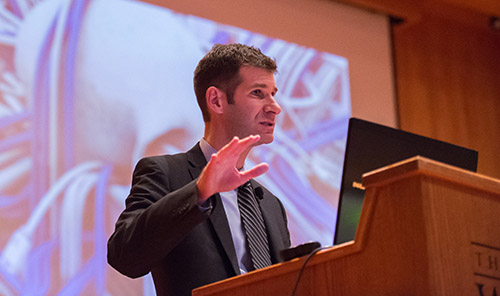
Cyber Security Expert Puts Growing Crisis into Perspective

WOOSTER, Ohio — Cyber security breaches have become one of the world’s most feared, least understood threats in recent years, and Peter Singer, an international expert on 21st century warfare, says that enlightening the masses is the first step in effectively confronting the crisis. Singer, speaking at the second Great Decisions lecture of the spring semester at The College of Wooster, made his case during an informative, entertaining, and witty presentation, titled “Cybersecurity and Cyberwar: What Everyone Needs to Know,” last Thursday in Gault Recital Hall of Scheide Music Center.
“Adults are more afraid of a cyber attack than the rise of China or global warming,” said Singer to a large gathering of college and community attendees, who braved the bitter cold winter weather to hear him speak. “Every year, America’s armed forces face millions of cyber attacks; businesses experience cyber security incidents; and $500 billion is spent on data breaches.
“Despite all the promises of the digital age, we live in an era of cyber insecurity,” added Singer, who pointed out that although the threats are real and ominous, most people are not well enough informed about the situation, and that includes the current crop of presidential candidates. “Cyber security is considered important [among the candidates], but it is lacking in emphasis,” he said. “It is being treated as a topic for the IT (information technology) crowd, but many others are making decisions who don’t really have the tools to do so.”
Singer said that what people fear most is the apocalyptic “Cyber Pearl Harbor” or “Cyber 9-11,” but the greatest threats are those affecting things like financial holdings and intellectual property. “We seem to lump them all together because they involve the same technology, but each threat is different,” he said. “To date, no one has been hurt or killed by cyber terrorism.”
As a strategist, Singer laid out a four-point plan for dealing with cyber threats, beginning with the notion that people matter. “Human capital is very important,” he said. “In 2008, 40 people worked in the area of cyber security in Department of Homeland Security. Today, we have a massive demand, but there are not enough skilled people available to fill the open positions. It’s a huge opportunity for universities and business to fill the pipeline and to get women and minorities involved.”
Singer’s second point was that knowledge also matters. “Many people look at the internet as a domain for nerds, but the security of cyberspace is important to all of us,” he said. “The presidential candidates are busy trying to ‘get smart’ about issues like healthcare, which is very important to voters, but they are still not well versed in the area of cyber security, and not able to make informed decisions.”
Singer added that incentives matter as well. “Banks have more cyber security than the power industry,” he said, noting what’s at stake and adding, “incentives apply to all organizations.” He went on to say that the mentality is also important. “Do we look at cyber security as a defense or a deterrent?” he asked. “What we really need to think of is our resilience. No matter how good you are, the bad guys will get in. In fact, [one can assume] they already are. So the question becomes how quickly can you shrug them off and move on. The British have found a way to stay calm [after an attack] and carry on. This takes some of the incentives away from the hackers, whose goal it is to create an atmosphere of terror.”
Finally, Singer called for a form of “cyber hygiene.” “We need to think not just about the measures we take, but to acknowledge the collective responsibility we have to protect others,” he said. “This would stop 90 percent of cyber attacks, and help to keep all of us safe.”
A question from the audience following Singer’s formal presentation reinforced his message for the evening. A woman expressed concern about cyber threats to the power grid, and while Singer acknowledged that such breaches are certainly possible, he pointed out that squirrels have been responsible for more power outages across the country than any terrorist group — a point well taken on a campus where such creatures are known to flourish.
Posted in News on February 15, 2016.


